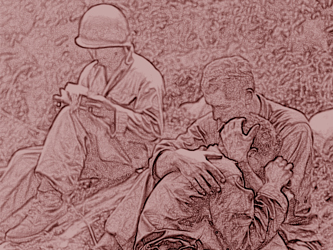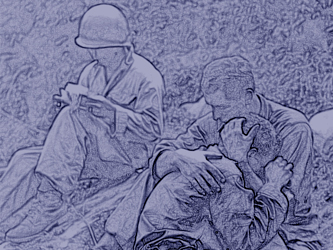War is a travesty. War is always tragic. Why should any of us write poems about war? Well, let’s remember how often poetry has celebrated war. Poetry has often been seen as a vehicle for patriotic fervor and nationalism—and even now, while sex is often a topic of taboo, violence in the name of justice is still celebrated many times a day. You don’t believe us? Flip on your TV. We’re sure there’s something on right now, where the hero of justice is shooting or beating someone much to the delight of the viewers. We have mixed feelings about this. It’s not that we think all poetry should be of a realistic vein, it shouldn’t be. But when we pick up the pen, whatever we write, we have to take some responsibility for it. There’s nothing didactic here, nor do we wish to preach, instead we simply have striven in our poems, to bring home some of the evils of war.

War Games, a poem
by Charlie Tann
On the high cliff
stands the command
with a face so pure
and so serene
that only the loftiest thoughts
must fill that unwrinkled brow;
yet in those eyes
reflections of a tumult
from deep down below —
blood that floods the war plain
and stains the heath,
warriors dying by the droves
over a strategy hatched
with a glass of sherry.

Trench Warfare, a poem
by Ivan Edge
They say a million and a half shells
have been taken up to the gun batteries
in preparation for the big attack.
These are shrapnel shells;
they are packed with lead balls
so that they’ll rip through flesh
and they’ll bring maximum casualties.
My trench shakes with each explosion;
my whole world jumps and quivers;
dust and ashes fly about me;
it’s a blizzard of gray embers
among a constant boom.
Twenty tons of explosives
to decimate the line in front of us;
my sergeant drags on his cigarette,
they’ll be nothing left of them,
it’ll be a f*cking cake walk.
The war’s over now, boys.
We all all look at him;
we’ve sunken in cheeks
and eyes that are driven in deep;
we’ve the look of lost puppies,
but we all nod and agree,
yeah, a waltz all the way to Pozières.
Then the time comes,
and we brace ourselves for a leap
out of the trench and into the war,
ready, set—the whistle blows
and off we go.
I’m moving as fast as I can
among the gray smoke—
I nearly trip over our own barb wire,
then I’m sprinting through no man’s land
when it goes off, thud, thud, thud—
machine guns!
The guy to my right falls,
he’s from a small town in the north,
a barber with a cute plump wife
and a new baby.
He takes a bullet in the face,
and falls forward into his own blood.
The guy to my left, he’s from the city,
he says he’s going to go to college,
and major in mechanical engineering,
only for now he’s holding his intestines
in his bare hands.
Me, I’m on the ground.
I don’t know if I’ve been hit or not.
The machine gun continues its thudding,
then there’s a boom and an explosion,
and more soldiers rushing into the mix;
I jump up and run with them.
We make it to the German side,
and we get across their barb wire;
then we jump into their trench.
There’s almost no one about,
and we kill the few poor bastards there—
after all this warring, a little bit of victory.
We quickly set up a position,
even as a friend asks me,
you all right?
I look down, and see I’ve been bleeding.
We open my shirt.
A bullet went clean through my stomach—
it was a miracle bullet that caused no harm,
just the bleeding that we stanch.
We’ve got no food, no water,
and our ammunition is quickly running out.
More bombs go off,
and in the distance we hear shouts of gas!
but it never materializes.
Through the whole night
we keep the trench,
but then in the morning, more men arrive,
only to tell us our orders, retreat!
Going back through no man’s land
in a wild mad dash, I lose two more friends,
and I’m sure I’ll take a bullet in the back
until at the very end when I literally trip
and fall forward into my own trench.
I’m just where I was at the start
only now I clutch at my gut
and soon, their loading me onto a stretcher
and taking me behind the lines,
it seems this is how you earn time off.

War Injuries, a poem
by Jules Angold
The effects of phosgene gas come on slowly—
first your eyes and throat burn,
but sometimes, you still think you’ll be okay.
It might be as long as two days before you die.
Your lungs the whole time gradually filling with liquid
until finally you drown.
Anyway, most people die from bullets—
oh, and the shells,
I should tell you about the shells.
They contain high explosives
and when they detonate
they scatter pieces of jagged metal—
sometimes eight or ten inches long;
without any trouble at all
they can sheer your head clean off
or sever a hand or an arm or a leg.
I’ve seen such horrifying wounds
when I bear the stretcher back and forth
from the battlefield of war—
I remember one guy holding in his guts
with his bare hands,
when the doctor got to him
he just shook his head.
He took the guys intestines out
and stuffed in some cotton.
I didn’t understand,
but he told me he was dying anyway,
and this would offer him some comfort.
We don’t have any pain killers,
but we’ve chloroform.
It’s saved for the surgeries;
they start at seven in the morning,
and they go on until one a.m. at night,
because there’s a constant influx
of new bodies.
There’s not enough help—
though there are some young women
from the nearby village;
they should still be in school
but they try to offer comfort to the wounded.
One of these girls tells me,
she once watched over a dying soldier
constantly for two days;
she said he kept calling out for his mother,
that he wanted to see her before he died.
She held his hand most of the time,
and then when death was near,
and he called for his mother yet again,
she whispered in his ear
I’m here, darling,
then then she kissed him on the forehead
and watched him die.

There was never a good war, or a bad peace.
— Benjamin Franklin
We always try in our final words to achieve a little wordplay with the topic we’ve chosen. Despite our somber topic, we’d still like to encourage you to write your own ballads of battle, sonnets of skirmishes, couplets of conflict, or perhaps even a haiku of hostility. Just remember, take responsibility for what you write. Let’s not needlessly glorify war. Also, don’t forget to subscribe to our poetry updates, less you miss our next poem!